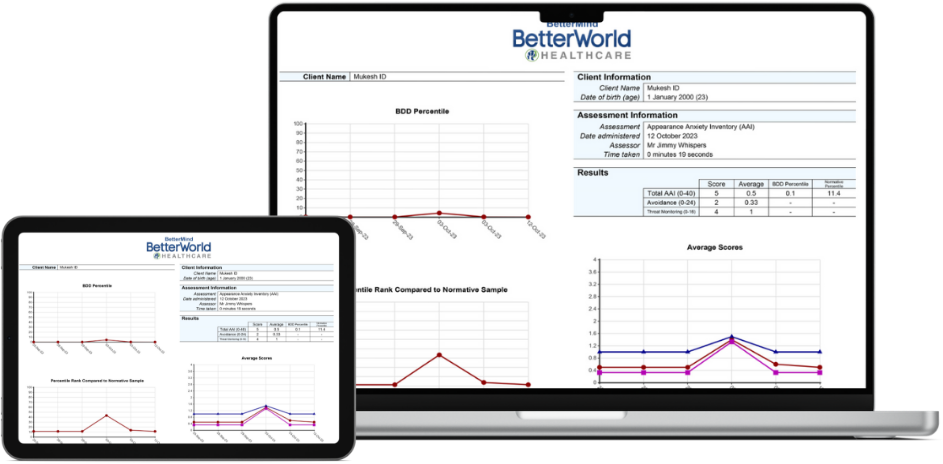Revised Child Anxiety and Depression Scale – Child version (RCADS-Child)
Assessments
Description
The Revised Child Anxiety and Depression Scale (RCADS-Child) is a 47 item self report questionnaire that measures symptoms of depression and anxiety in children and adolescents aged 8 – 18. It consists of six subscales including separation anxiety disorder (SAD), social phobia (SP), generalized anxiety disorder (GAD), panic disorder (PD), obsessive compulsive disorder (OCD), and major depressive disorder (MDD). The RCADSChild can be used to screen for and monitor symptoms of depression and anxiety.
A parallel version of the RCADS-Child, The Revised Child Anxiety and Depression Scale Parent version (RCADS-Parent) assesses the young person’s symptoms of depression and anxiety from the parent perspective and can be utilised in conjunction with the RCADS-Child.
Validity
The RCADS-Child was developed by Chorpita and colleagues (2000). The scale was administered to 1641 children and adolescents in the community. Six factors were yielded, consistent with DMS-IV disorders of anxiety and depression, including separation anxiety disorder, social phobia, generalised anxiety, panic disorder, obsessive compulsive disorder and major depressive disorder.
The RCADS-Child has demonstrated good structural validity, reliability and convergent and discriminant validity (Chorpita et al., 2000).
The RCADS-Child has also been validated in an Australian community sample (N = 405) of children and adolescents aged 8 -18 (de Ross et al., 2002). The sample was divided into two age groups, 8-12 years and 13-18 years of age.
Interpretation
A Total Anxiety Scale score (sum of the 5 anxiety subscales) and a Total Internalizing Scale score (sum of all 6 subscales) are derived, with higher scores indicating increased symptom severity. In addition, items are summed to obtain a total score for each of the six subscales. Subscale scores are converted into percentiles, based on age, compared to the Australian community sample (de Ross et al., 2002). A percentile score of 50 represents average levels of symptoms compared to age related peers, whereas a percentile above, for example, the 90th percentile indicates high levels of symptoms.
Sub-scales are computed by summing the following items:
Separation Anxiety: items 5, 9, 17, 18, 33, 45, 46
Social Phobia: items 4, 7, 8, 12, 20, 30, 32, 38, 43
Generalized Anxiety: items 1, 13, 22, 27, 35, 37
Panic Disorder: items 3, 14, 24, 26, 28, 34, 36, 39, 41
Obsessive-Compulsive: items 10,16, 23, 31, 42, 44
Major Depression: items 2, 6, 11, 15, 19, 21, 25, 29, 40, 47
Developer
Chorpita, B. F., Yim, L., Moffitt, C., Umemoto, L. A., & Francis, S. E. (2000). Assessment of symptoms of DSM-IV anxiety and depression in children: A revised child anxiety and depression scale. Behaviour research and therapy, 38(8), 835 855.
Try it and see how BetterMind can enhance your practice

Support
Frequently Asked Questions
You’ve got questions, we’ve got answers. Below you can find answers to some of the most frequently asked questions. If you can’t find the answer you’re looking for, please feel free to reach out to us at info@betterworldhealthcare.com.
I can’t open test results within the Web Browser
Assessment result PDFs are opened in a new tab within the web browser. If you click the results but they do not open, your browser will be blocking the popup. To resolve this, after you have pressed the test result, look out for an alert at the top of your browser notifying you that a pop-up has been blocked, then click "Allow".
I have forgotten my password. How can I reset it?
If you have forgotten your password please press “forgot password” within the app, or on the Web Browser App login page (https://app.bettermind-app.com/login). You will receive a new temporary password via email.
Can a Practitioner access BetterMind from their Smartphone?
No, A Client /Patient can answer assessment questions on a smartphone but the Practitioners/ Users can't administer BetterMind using a Smartphone. A computer, laptop or tablet will have to be used.


